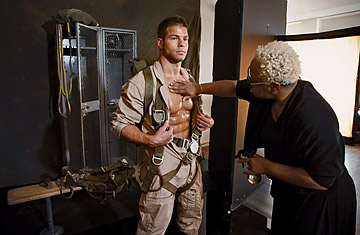
(2 of 3)
Often taking their cues from the headlines, romance novels are remarkably accurate weather vanes for changes in the pop-cultural climate. Vampires, for instance, were dominating romance before Edward Cullen had lost his milk fangs. Dark Fire, the sixth vampire novel in Christine Feehan's Dark Series, hit the Times best-seller list in 2001, part of a wave of otherworldly romances that arrived years ahead of Twilight. And because mass-market companies crank out books at such a high volume (Harlequin releases 110 a month), the steady stream of sales data gives publishers a rolling sense of when and how tastes are evolving.
Those sales figures also show that the genre is exceedingly hardy in an economic frost. In 2010 romance books generated $1.36 billion in revenue; in the crisis year 2008, the recession bit into virtually every book-buying category except romance, making it the No. 1 category of a frigid year (last year it was No. 4). "As the financial collapse started, fewer people were buying hardcovers," says Michael Norris, a senior analyst with Simba Information, which provides research and analysis to publishers. "But romance books are priced so low to begin with"--often under $8--"that fewer compromises needed to be made by the consumer."
Some industry watchers believe the recession has rekindled the appeal of a rugged workingman ideal. "You won't find many heroes in romance today who are in finance or any kind of white collar job," says St. Martin's Press associate publisher Jennifer Enderlin. "Readers want men who work with their hands and not with their minds." When times are tough, a guy who knows the taste of sacrifice, suffering and duty is an apt fantasy. Romance author Lisa Marie Rice, whose Protector novels have featured killer boyfriend material in the form of ripped SEAL and Delta Force fighters, says, "If you have a man who's stuck with you when bullets are flying, this is a man who will stick by you if you get breast cancer." Or, presumably, if you lose your job.
The steady drumbeat of news about returning veterans of the Iraq and Afghanistan conflicts also influences matters of the heart. "Women are seeing these men who fight for the love of their country and to protect their families," says Gina Wachtel, associate publisher at Ballantine Bantam Dell. "All women are looking for that, particularly those in problematic relationships. It's like a lifeboat." These heroes promise strength, safety and military-grade sex. They also offer their heroines (and, by proxy, their readers) the opportunity to nurture a wounded, handsome, decent guy back to wholeness--as in Rogenna Brewer's tale Mitzi's Marine, wherein one point of the central love triangle is a gunnery sergeant who lost much of one leg in Iraq.
Battle-scarred reality, however, has its limits. For the most part, posttraumatic stress disorder, unemployment and other challenges faced by veterans are a no-go area for romance writers. And while these heroes have an everyman air, they're strictly 1% in the context of their profession. The soldiers aren't regular grunts; they're Special Forces. The cops aren't just cops; they're elite ops. The firefighters are smoke jumpers, the kind of sooty daredevil Ricci channels for the cover of Burning Up.
